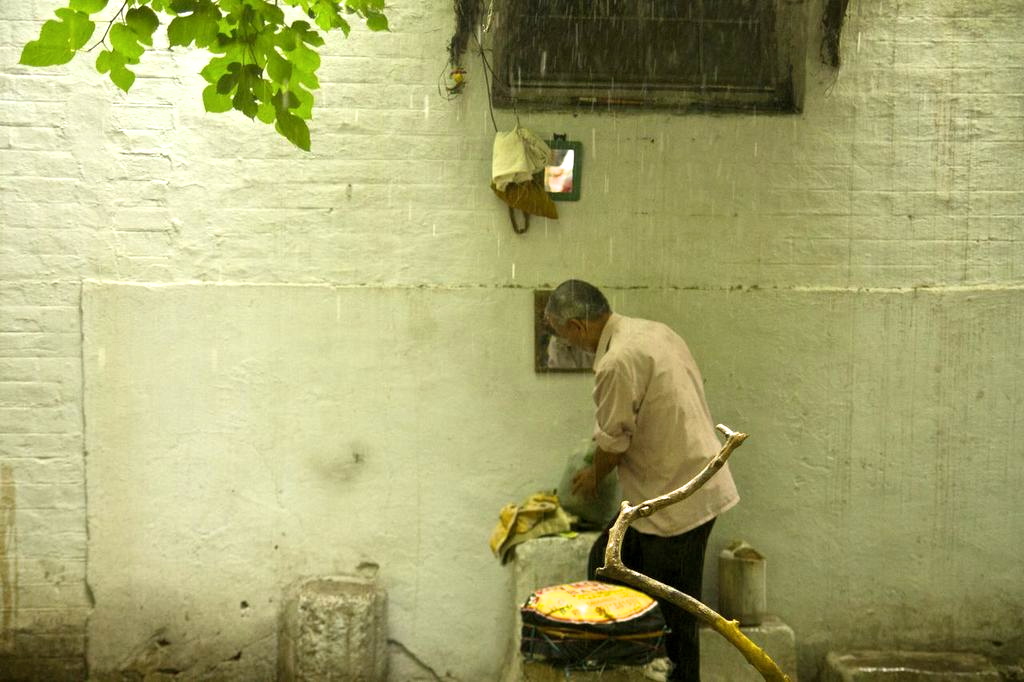For Delhi's street poor, monsoon can slash or boost wages


DELHI –- Govind Ram, a 55-year-old barber, who has set up shop on a quiet corner in Delhi’s green diplomatic area had to run for cover when it suddenly started raining one June afternoon.
It didn’t take him long to gather up his instruments –- scissors, a small mirror, a couple of razors and a some shaving cream. But it cost him a couple of customers who would have trickled in before the sunset.
Every monsoon season, rains hit Delhi’s bustling street economy, largely made up of beggars, hawkers and street vendors. Since they live hand to mouth, with very few savings, a day’s loss means skipping that day’s meal.
SmartPlanet took to the streets to collect some of their experiences.
Ram, a widower, who also lost his son in an accident, lives alone in the big city. He can’t afford to rent a small room to set up business. But his little outdoor shop has become a way for killing the loneliness, which he sometimes finds himself engulfed in. “You get to meet all sorts of people and you keep talking. Otherwise there is little else in life,” he said.
The barber charges between 30 rupees to 60 rupees (30 cents to $1) for a haircut. “I charge people according to their means,” he said. “I can’t say how many people come for a haircut everyday but on an average five to six.”
“If it rains the whole day, then of course the income is zero,” he said.
Bina Devi, a 25-year-old flower seller, came from Rajasthan to Delhi in search of work. With one child to support, she quickly settled for selling flowers along with other members of her community, who were also trying to scrape together a living in the big city.
In the night, summer or winter, they sleep under bridges. Many of their children add to their daily wages by begging. Bina says that she can earn about 100 rupees or $1 a day from selling flowers –- on a good day.
When it rains, Bina said, the flower-selling business on the streets gets hit badly. “Well, for one thing, people don’t like to pull down their windows,” the flower seller said, laughing. “And if it rains too much, even we can’t stand on the road too long completely drenched.”
“Nobody has much money to buy food in those days,” she said. “But we all pool together what we have and share.”
But for Jai Prakash, the corncob seller, the monsoon season boosts his sales. In the few hours before and after it rains, when the temperature falls and the light breeze floats across Delhi, he says, people want to dig into corncobs.
Prakash, 27, from Uttar Pradesh, used to have a small kiosk of cigarettes and other tobacco products. About a year ago, he was hit by a motorcycle and had multiple fractures on his leg. After spending a month in the hospital, he returned to find his booth stolen.
So Prakash decided to sell roasted corncobs at the same place where his shop stood earlier. Now, he buys corn worth about 100 rupees everyday. He sells each cob at 15 rupees or 25 cents. Prakash says that during hot summer days he makes about 300 rupees, or $4, from his sale. But during the rains, his sales go up to 600 rupees or $10 per day.
Although, when it suddenly began to rain, Prakash ran for cover under the staircase of a nearby metro station.
Ashok Thappa, 35, used to be a driver who earned 3,000 rupees, or $80 a month. A year ago, he was handicapped after a road accident. Nobody in his family came forward to help him.
Now, he hobbles about with a walker, begging for money when cars stop at traffic lights. “You have to be careful not to get hit,” he said. “But actually, some people give quite generously these days.”
Thappa says that he can earn about 100 rupees to 200 rupees ($2 to $4) a day from begging. On rainy days, Thappa says that he doesn’t attempt going out on the streets because it isn’t easy to move quickly with the walker on slippery roads, and he is afraid of falling.
Thappa used to rent a small room when he worked as driver. Now, he sleeps on the street. During the rains, he finds space at the temple or at a government shelter if it isn’t overcrowded.
But he gets free food everyday from a Sikh temple located close to where he begs. “Food is not a problem,” he said. “The little bit of money I get is for cigarettes, and I’m also trying to save some to see if I can set up my own business in the future.”
Photos: Betwa Sharma
This post was originally published on Smartplanet.com